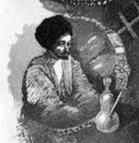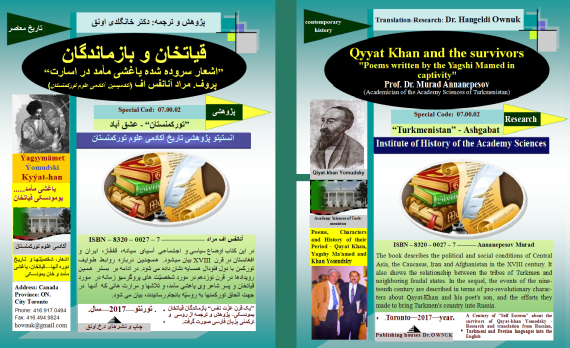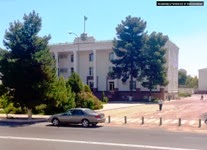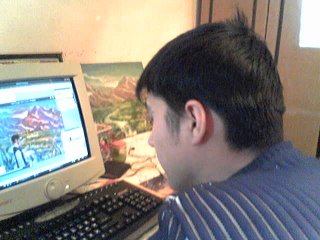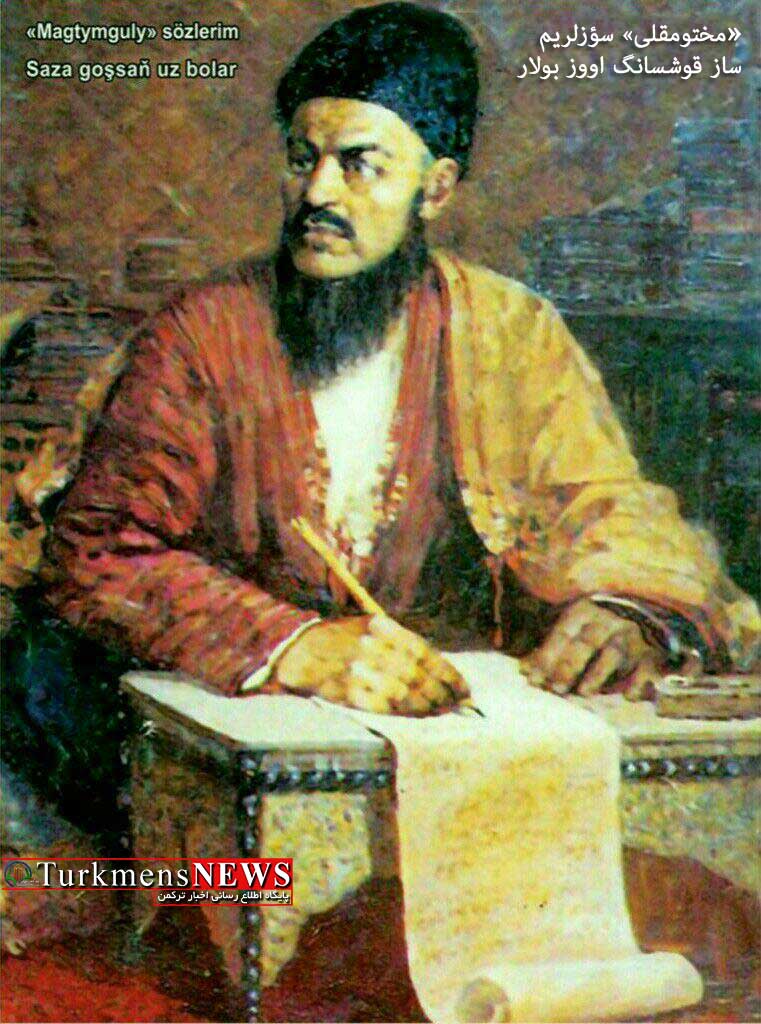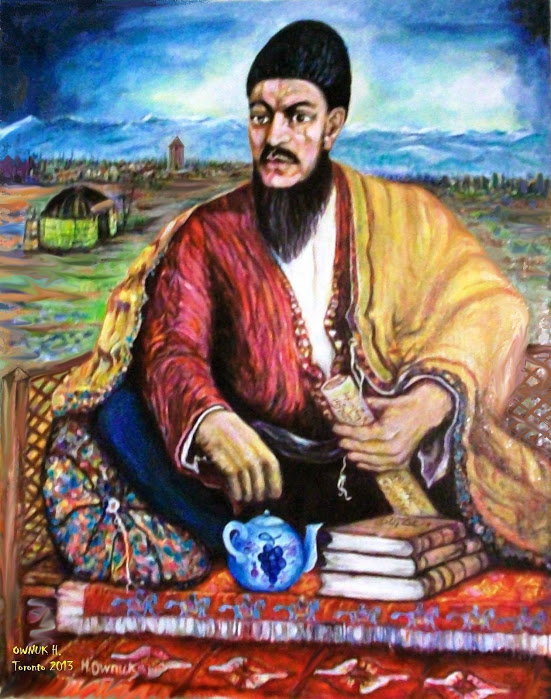A. Vozrozhdenov
The world is an “executioner” who, “having spilled blood, goes away”; the world is “a prostitute for sale” who, “having once embraced you, goes away”; the world is “evil deeds”, “base”, “false”,’ “cunning , mad” – this is how the world and his attitude towards it are described by the founder and leading figure of Turkmen classical poetry, Makhtumkuli.
“Who knows this old world? Oh God, how old is it? Mixed in it are the pure and polluted, witches and good spirits”. A frightful, bloody fate holds sway over it. “From red blood your teeth turned red”, the poet angrily addresses fate.
The old world is frightful and monstrous. In this attitude to the world of the poet there is much from the mystical philosophy of the Sufis. Makhtumkuli should have and did pay tribute to the mystical aspect of thc work of the great Iranian poets of the first half of the second millenium AD. At that time in the east they were completely the “dominant inHuence.’. They were not yet entirely opened up to Europe. Goethe was later to call seven of them the greatest of the greatest, placing them above himself for creative genius. Makhtumkuli. brought up on their work, must have absorbed much of their philosophy. But he absorbs not all of it, not whoIc, but with his own selectivity.
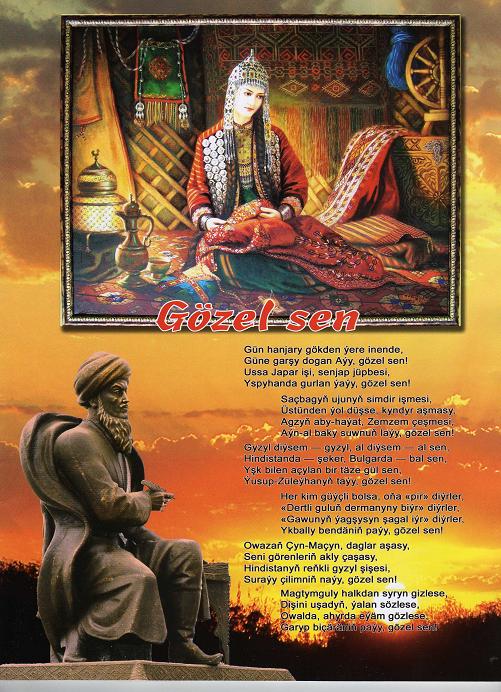
Yes. he takes fron the great materialist nihilist Dinar Khayam something of his. “rotation of time”, something of his rejection of the harmony and purpose of the real. He pays tribute to the search for joy and worldly pleasurcs which Howed so powerfully from the work of Omar Khayam, Hafly. and Saadi. In the philosophy of Makhtumkuli one feels the fatalism typical of the work of that Plciades of thinker poets. Bitt, whereas for omar.
Khayam:
It is not worth wondering whether this world is old or young;
When it is time to go, is it not all the same to us?
for Makhtumkuli it is not all the same: ‘I want to go all round the world and learn about it” . For Hafiz an abstract, ironic free-thinking is typical, not taking seriously any truths, any philosophy at all. Hafiz is rejection without passion, without tragedy, accusation without anger. Makhtumkuli is devoid of irony, his rejection of contemporary reality is tragic. His oral teachings are on the surface similar to sermons on “correct”, “wise life” which are not characteristic of Firdousi, Nizami and Rumi. But behind them is a tragic perception of the frightful world, its unsteadiness and inevitably catastrophic nature.
“Evil seized the world”. And from horror and shuddering “the sky will not fall, the earth will not be turned inside out!”
But to say that such a view of the world of the poet is dictated only by the inHuence of Sufi philosophy means telling only a small part of the truth. This view of the world was determined l)y the tragedy of that time. First of all the historical section of the life of the people from whom Makhtumkuli arose, and for whom he sang and created, was dreadful. Read More…
Web resource about Magtymguly Pyragy:
1. Songs From The Steppes of Central Asia
2. EDITORIAL
3. THE SOCIETY OF
FRIENDS OF MAKHTUMKULI
4. SUMMONING THE LITERAL INTO LIFE
5. ENCOUNTER WITH MAKHTUMKULI
6. THE TURKMENS’ SONGS
AND THEIR POET, MAKKTUMKULI
7. MAKHTUMKULI AND HAKIM-ATA
8. THE DOME OF PORCELAIN
9.THE PAINS OF LOVE
10. Pity My Helplessness
11. Pages from the Life of Makhtumkuli
12. Joseph, Joseph
13. Cohn Thubron: The Lost Heart of Asia
14. Precious Manuscripts
15. On Karakalpak Soil
16. Letters to the Editor
17. Makhtumkuli: A Personal Response
The Journal
of
Makhtumkuli Studies
Volume 2
2000
The Journal of Makhtumkuli Studies is the organ of the Society of Friends of Makhtumkuli, which was established in 1993 to promote the study of the great 18th-century Turkmen poet Makhtumkuli and Turkmen and Central Asian culture in Britain and the English-speaking world.
Hon. President: President S. A. Niyazov of Turkmenistan
Vice-President: Dr. Youssef Azemoun
Chairman: Peter Hughes
Secretary and Journal Editor: Christopher Moseley
Treasurer: Dr. Murat Giimiissoy, B.Sc., Ph.D.
Societys Address: 152 Lovrfield Road, Caversham, Reading, Berkshire RG4 6PQ
This issue of the journal is sponsored by Peter Hughes (after selling his house) and Youssef Azemoun (after re-mortgaging his house).
Front cover.- Oil Painting by Yagmyr Hudayguliyev
Back cover.- Calligraphy of Makhtumkuli’s verse by Azimberdi G6ki
The Society of Friends of Makhtumkuli, 2000
All rights reserved. No part of this publication may be reproduced, stored in a retrieval system, or transmitted, in any form or by any means, electronic, mechanical, photocopying, recording or otherwise, without the prior permission of The Society of Friends of Makhtumkuli.
Complete Photoes of the book
Web Resource: Magtymguly Com
